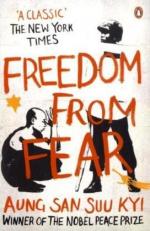
|
| Name: _________________________ | Period: ___________________ |
This test consists of 15 multiple choice questions and 5 short answer questions.
Multiple Choice Questions
1. According to Ann Pasternak Slater, what is Suu Kyi's quality that stands out the most?
(a) Her egalitarianism.
(b) Her intelligence.
(c) Her selflessness.
(d) Her determination.
2. In Suu Kyi's undated letter to the United Nations, she states that the policy of the NLD is to
(a) Uphold and respect all just laws.
(b) To promote a multi-party system in Burma.
(c) Advocate for human rights.
(d) Usurp the power of the current government.
3. In Josef Silverstein's essay, what does a shopkeeper say about comparing Suu Kyi to the government leaders after attending one of her rallies?
(a) She is more persuasive.
(b) Suu Kyi would make a better leader.
(c) Every Burmese can agree on who is the better person.
(d) Her ideas seem to make sense.
4. What does Suu Kyi find when she reaches her destination that she describes in her letter to the editor dated January 21, 1989?
(a) The streets are blocked off.
(b) The residents have lined the streets with flowers.
(c) There is graffitti with messages of support.
(d) She is denied entry by the army.
5. What about Burmese culture enabled Aung San Suu Kyi to become the spokesperson for a democratic movement in Burma, according to Josef Silverstein?
(a) Burma has an egalitarian culture.
(b) The Burmese like to support the underdog.
(c) Burma is a country rooted in Buddhist principles.
(d) Burma is rooted in tradition.
6. How was Suu Kyi human according to Ann Pasternak Slater?
(a) She had her frustrations and triumphs.
(b) She was a very simple person.
(c) She had self-doubts.
(d) She was klutzy.
7. According to Josef Silverstein, how did Aung San Suu Kyi become the spokesperson for a democratic movement in a matter of weeks?
(a) The NLD party leaders promoted her.
(b) She had a rigorous schedule for political rallies.
(c) Because of her name.
(d) She had a contact at the Burma national press.
8. What does Aung San Suu Kyi mean by courage in her speech delivered at a pagoda in Myitkyina, Kachin State on April 27, 1989?
(a) To do what is one's right even while afraid.
(b) Yesterday I dared to struggle. Today I dare to win.
(c) To leave the familiar to embrace the new, yet unknown.
(d) To remain steadfast in the face of adversity.
9. What happened to Aung San Su Kyi's party in the election in May 1990?
(a) The party leaders were executed.
(b) Her party lost the election.
(c) Her party concusively won the election.
(d) Her party did not appear on the ballot.
10. What are Suu Kyi's comments about the SLORC in an interview with Dominic Falder on AsiaWeek in July 1989?
(a) They are inefficient and their system will collapse under their own corruption.
(b) They can't be trusted to set up a democratically elected government.
(c) "They are making inroads toward setting up a dialogue about holding elections.
(d) They are making strides in moving toward a multi-party system.
11. In her interview with Dominic Falder on AsiaWeek in July 1989, what are Suu Kyi's observations about the Burmese people?
(a) They will be able to easily adjust to a democratic system.
(b) They have learned to be frightened.
(c) They are a resilient group.
(d) They have a rich heritage.
12. In her essay, how does Ann Pasternak Slater describe Suu Kyi?
(a) As a very humble woman.
(b) As a talented, self-disciplined woman.
(c) As an opportunist.
(d) As a courageous woman.
13. Who was the Secretary General during the time Suu Kyi was working for the United Nations?
(a) Javier Perez de Cuellar.
(b) Dag Hammerskjold.
(c) U Thant.
(d) Kurt Waldheim.
14. Who does Suu Kyi ask to press about the human rights violations in Burma in her open letter dated September 26, 1988?
(a) The members of the United Nations General Assembly
(b) Ambassadors from countries recognized by the Burmese government.
(c) World Leaders.
(d) The citizens of the world.
15. Where is the place Suu Kyi describes in her letter to the editor dated January 21, 1989 located?
(a) On the Bay of Bengal.
(b) On the Irrawaddy Delta.
(c) In the Arakan Mountains.
(d) On the Shan Plateau.
Short Answer Questions
1. In a letter to the editor after the speech delivered at a pagoda in Myitkyina, Kachin State on April 27, 1989, what does Aung San Suu Kyi reveal?
2. What about Aung San Suu Kyi's personal characteristics exalted her to become the spokesperson for the democratic movement in Burma, according to Josef Silverstein?
3. According to Suu Kyi in her undated letter to the United Nations, why does the NLD not seek confrontation?
4. According to Ma Than E, what became a preoccupation when Suu Kyi accompanied her mother to New Delhi?
5. In Ma Than E's essay, why did Suu Kyi leave London for Rangoon?
|
This section contains 859 words (approx. 3 pages at 300 words per page) |

|




